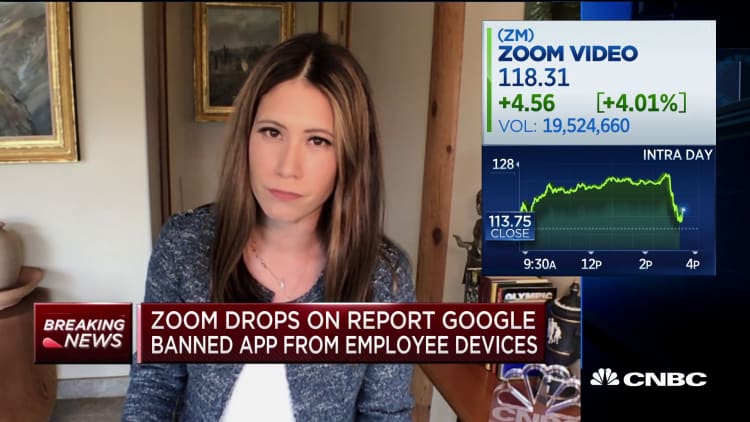House Speaker Nancy Pelosi of California called Zoom "a Chinese entity" in a television interview, despite the company's roots in Silicon Valley.
The remark lines up with some public criticism of Zoom after millions flocked to it to hold meetings virtually while staying home to avoid spreading the Covid-19 coronavirus. The surge of interest has sent company's stock higher while broader indices fell. But in recent weeks, Zoom has also dealt with security and privacy issues, including "Zoombombing," where intruders take over meetings and post offensive images, and the possible routing of some calls through servers in China, which the company now says was accidental.
Pelosi's comments came after she was asked about the possibility of Congress voting remotely.
"People think we can do Congress by Zoom. Zoom is a Chinese entity that we've been told not to even trust the security of," Pelosi said, according to a transcript of her conversation on Tuesday with MSNBC's Chris Hayes. "So there are challenges, it's not as easy as you would think."
Strictly speaking, Pelosi's statement was not accurate. Zoom was founded in 2011 and has been incorporated in Delaware since April 21, 2011, according to a record on the state's website. When the company raised $6 million in 2013, its headquarters was in Santa Clara, according to a statement.
However, Zoom's product development team is based "largely" in China, and it operates research and development centers in that country, according to the company's most recent annual report.
Co-founder and CEO Eric Yuan, who previously worked on the Webex video calling product that Cisco acquired in 2007, is the largest individual shareholder of Zoom with 3.9% of the stock's outstanding shares. He emigrated from China in 1997, when he was 27, CNBC previously reported, but he is a U.S. citizen, according to a December regulatory filing.
Zoom has also come under fire for potentially routing some meetings through data center infrastructure in China, which the company says was not supposed to happen. However, the company took steps to prevent that from happening further, according to an April 3 blog post from Yuan.
Zoom saw record usage as coronavirus took hold, and in February the company added servers to handle the surge, including in China. In doing so, though, the company didn't follow its usual policies, and some meetings might have connected to systems in China when they shouldn't have, Yuan wrote.
Zoom took the Chinese data centers off the list of secondary backup bridges for users outside China soon after learning about the issue, Yuan wrote.
"It's a reference to the criticism and security concerns stemming from the company routing large numbers of their calls through China," a Pelosi spokesperson told CNBC in an email on Wednesday in reference to Speaker Pelosi's remarks.
Zoom didn't immediately respond to a request for comment.
WATCH: Zoom shares drop after report Google banned app from employee devices



